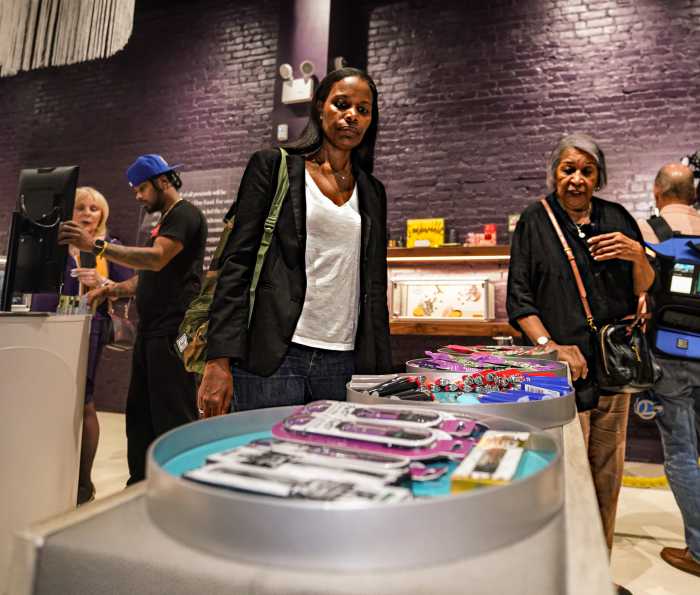A dozen NYC-based cannabis businesses are suing to block the state Office of Cannabis Management from enforcing a newly reinterpreted school-distance rule, arguing the abrupt reversal threatens to wipe out their businesses and undermine the state’s equity goals.
The group is among 152 dispensaries and license holders affected by the OCM’s decision last month to reinterpret its buffer rule to measure from a school’s property line rather than its entrance.
Seven of the businesses — ConBud, Summit Canna LLC, The Cannabis Place, Hush, High Fade, Housing Works Cannabis Co., and Common Courtesy Dispensary LLC — hold final licenses from the Cannabis Control Board and operate at locations previously reviewed and approved under the old standard.
The other five — Rezidue, Elise Pelka LLC, Luxe Leaf Boutique LLC, Toastree LLC, and Monarch NYC LLC — have provisional licenses.
According to the lawsuit, all have invested heavily in their locations, with three completing build-outs and awaiting final virtual inspections.
In the complaint filed Friday in Albany County Supreme Court, the group says the OCM and Cannabis Control Board repeatedly confirmed their sites met the law, prompting them to sign long-term leases, invest over $1 million each in renovations, hire staff, and, in most cases, open their doors.
Cannabis businesses caught in ‘limbo period’
The OCM and Gov. Kathy Hochul have pledged support for impacted dispensaries and applicants, and that all licensees impacted by OCM’s proximity correction can continue to operate fully. They say license holders with renewals due during the “limbo period” can continue operating under the State Administrative Procedure Act.
They say a legislative fix should be considered when lawmakers return in January, though they have acknowledged it is not guaranteed.
Those affected have urged swifter action, calling for a special legislative session in October to pass a bill from state Sen. Luis Sepúlveda that would grandfather in any licenses approved in error.

The businesses argue that the July 28 letters from the OCM notifying businesses of the change offered no legal basis for retroactive enforcement, threatened non-renewal of existing licenses, and, for provisional licensees, demanded relocation, with only limited funding offered to some applicants.
The lawsuit alleges the rule change violates the State Administrative Procedure Act by bypassing the notice-and-comment process, strips businesses of due process and equal protection rights under state and federal constitutions, breaches the Marihuana Regulation and Taxation Act’s equity mandate, and amounts to an uncompensated regulatory taking.
As part of the lawsuit, the businesses are seeking injunctions barring enforcement of the new standard, a court declaration that their sites remain compliant under the prior interpretation, and a ruling preventing denials or non-renewals based on the revised method.
They warn the change could strip 152 state-approved dispensaries of compliance status, erase their market advantage, damage community relationships, and drive customers back to the illicit market — all “through no fault or misconduct” of the licensees.
Matthew Bernardo, president of Housing Works, accused the OCM of inflicting “incredible harm on real people, especially those in social equity groups that this program was designed to support.”
“The State has not followed its own review process, and the OCM’s proposal does not offer a real solution that honors the millions of dollars and years of effort invested by small business owners to open licensed dispensaries in New York,” Bernardo said in a statement. “We are calling for a fair, functional solution that includes every law-abiding and taxpaying license holder in New York. The State must protect these businesses, support their success, and ensure it delivers on its promise to communities across New York for a safe and fair cannabis market.”
‘We followed the rules’
Osbert Orudna, a service-disabled U.S. Marine Corps combat veteran and CEO of The Cannabis Place in Queens, told amNewYork that the decision to file the joint lawsuit is in part down to the state’s communication, which has revolved around having the impacted businesses operate in ‘an under review status, ’ “which doesn’t work for our banking, insurance, and leases, which all require us to have a valid license.”
“The state talks about hope for a legislative solution, the legislature doesn’t start meeting until January. and any bill would have to work through the legislative process, that, even if successful, can take months,” he said.
In a sworn statement filed Friday, Orduna said his long-term lease — $16,480 a month plus taxes — was signed in June 2023 after the location cleared state review.
He claims that since then, the dispensary has generated nearly $8 million in projected annual revenue, paid $1.2 million in state taxes, and employed about 30 mostly local workers, many from communities disproportionately affected by past cannabis laws.
The affidavit details more than $1.7 million in sunk costs for renovations, security, inventory, and operations, along with payroll exceeding $1.3 million.
He argued that his store has helped push out unlicensed shops selling untested cannabis tied to organized crime, and that forcing him to close could invite illegal operators back, jeopardizing public health and safety.

Orduna warned that if his license is not renewed in February, the business could face bankruptcy, job losses, frozen bank accounts, and permanent exclusion from the legal market — despite no history of violations.
He framed the fight as personal, saying his mission was rooted in turning the harm of past cannabis laws into community benefit and opportunity for veterans and justice-involved individuals.
“I am not asking for special treatment, only for fairness,” he wrote. “We followed the rules, made good-faith investments, engaged the community, and built our business in line with OCM’s approval. To have it all reversed by a late-stage reinterpretation of the law… would be devastating not only for us, but for the entire cannabis community.”
Another plaintiff in the lawsuit, cannabis entrepreneur Elise Pelka, says the rule change threatens to kill her dispensary before it opens in the West Village
According to court filings, Pelka, who holds a provisional CAURD license, leased space at 388 West St. in late 2024 after the state approved the site under its former standard.
She signed a 10-year lease at $48,000 a month, paid a $192,000 nonrefundable deposit, and spent more than $1 million on buildout, security, ADA compliance, and other mandated upgrades.
Pelka claims that she did all this in reliance on OCM’s approval. Her store is now fully constructed and awaiting final clearance to open.
Without relief, she warns, she faces $6.5 million in lease liabilities, canceled vendor contracts, and the collapse of a business she says was designed to serve the community and advance the state’s equity goals.
“My ability to relocate is not just burdensome, it is financially and logistically impossible,” Pelka wrote. “There is no guarantee that I would find another compliant property, and starting over would require additional capital I do not have. New leases demand high upfront costs, and many landlords are unwilling to work with cannabis operators at all.”
“I followed OCM’s instructions. Submitted everything that was required. Invested not only financially, but my time and effort in reliance on the agency’s approval. Now, without due process, OCM threatens to undo all of it based on a new proximity rule it never shared with us until it was too late,” she added.
In response to a query from amNewYork, the OCM said it does not comment on pending litigation. The case names the state Cannabis Control Board, Jessica Garcia as CCB chairperson, the OCM, and its Acting Executive Director Felicia A. B. Reid as defendants.







































